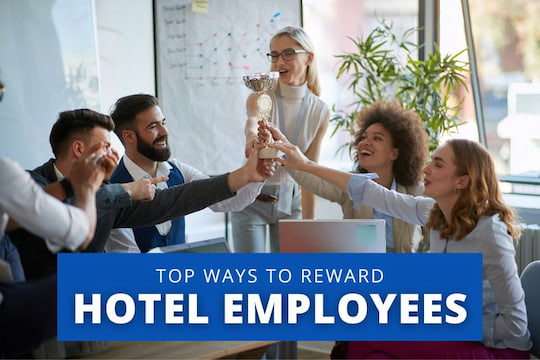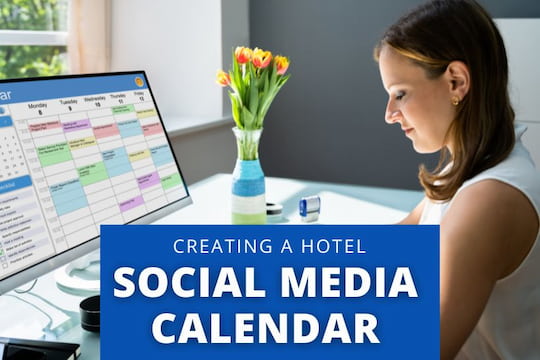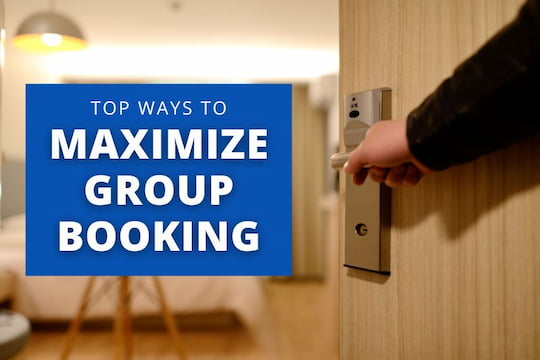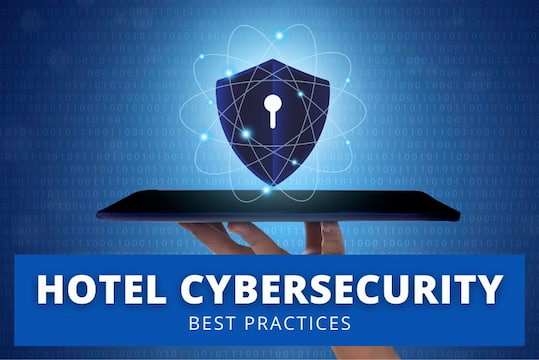When you incentivize employees, you're doing more than just improving their work life balance—although those are admittedly very important things. Rewarding your employees can also contribute significantly to your bottom line.
A good incentive or recognition program will make employees feel appreciated, so they'll be more willing to give the job their all. When they work well, the programs can increase productivity and help to create a vibrant working environment.
Let's explore some of the more creative ways to reward hotel employees.
What Are Employee Incentives?

An incentive can be defined as something that encourages a person to take action—or perhaps to avoid certain pitfalls, depending on the circumstances.
The term incentive refers to a promise or expectation, usually of a reward of some kind, that drives employees to act in a certain way. When you introduce incentives, you're trying to get your workers to behave a certain way. That could mean rewarding them for good attendance, outstanding customer service, or any number of things.
Employee incentives can take several forms. You might consider rewarding workers with a cash bonus or more paid time off. Tuition reimbursement is also a popular choice. Another option involves rewarding particularly productive employees with the opportunity to work remotely. The path you choose should be a reflection of your values and those of your company as a whole.
The Trials of Staffing a Modern Hotel
Have you noticed that it's getting tougher to fill your open hotel positions? You're not alone.
There are numerous opportunities for anyone looking to work in the hospitality industry. Unfortunately, studies from the American Hotel & Lodging Association show that many hotels are having trouble filling out their staff. Evidently, the housekeeping department is the most difficult one to round out, but all areas of the house are struggling on account of understaffing.
Why is this such a problem? There are a number of possible factors, including but by no means limited to:
- Undesirable hours that make it difficult to have a social life outside of work
- Seasonal fluctuations
- Perceived lack of career advancement opportunities within the field
These issues can lead to high turnover rates, which is particularly undesirable for an industry that strives to create a homey atmosphere. When the turnover rate is high, productivity suffers, along with the profits.
Is there anything you can do to improve your employee retention rate and become a magnet for motivated and professional workers? Read on to find out.
Staff Appreciation and Employee Retention

Did you know that businesses in the hospitality and food service industries lose an average of 6 percent of their staff each month? In fact, the annual turnover rate is close to 75 percent. You might have guessed as much based on your own experience, but it's an industry-wide issue.
You can help to turn these statistics around by implementing a strong employee recognition program. Additional studies have suggested that lack of recognition is what drives many workers to seek employment elsewhere. A whopping 65 percent of respondents have claimed that they feel underappreciated at work. When you look at it from that angle, it's not surprising that the retention rates are so low.
Employee Recognition Programs for the Hospitality Industry
Knowing how to reduce staff turnover in hospitality industry is one of the keys to success. When you have a low turnover rate, you're more likely to build a stellar reputation among regulars who will be eager to come back and spend more time with your long-serving staff.
These simple yet thoughtful employee recognition gestures should go a long way toward boosting your retention rates.
Implement a Rewards System
This is a great tool that will benefit you as well as the employees. Rewards systems allow you to track your staff's progress while promoting a fun sense of competition among team members.
First, decide what type of rewards system you'd like to create. You can track employee performance over the course of a week, a month, or even a quarter. Whatever you decide, be consistent, or the staff will lose interest.
The next step will be to determine how employees will be rewarded. Will they earn gold stars for every week of perfect attendance, or when a guest leaves a particularly glowing review? Keep the goals attainable, but make sure that the truly exceptional workers will stand apart from the rest.
You might consider using different measurement methods for various departments. For example, the front desk staff will earn points a certain way, while the housekeeping crew will operate on a different system. That will give everyone the opportunity to shine in their own way.
Finally, decide how you'd like to reward these outstanding employees for their hard work. We'll offer more ideas in that vein in the sections to follow.
Find Ways to Communicate
You don't necessarily want to encourage employees to toot their own horns, so to speak. But there's no reason why you can't do it for them.
Start by writing personal notes to your top performers. A simple handwritten note will make the employee feel singled out and special, just knowing that you took the time to write it out and sign it yourself.
Take it a step further by creating a "Rising Stars" or "Employee of the Month" board. This will create lively competition among your staff and help build a sense of community. Make sure to post it where the guests will see it, too.
Finally, consider sending out congratulatory email blasts to your entire staff. This allows co-workers to chime in with encouragement and recognition as well. As a bonus, you'll be able to see who's garnering the most praise from their fellow hospitality workers and encourage others to follow their example.
Give the Gift of Time
Working in the hospitality industry can be exhausting. When you're on duty, you have to put your best face forward at all times. Offering extra time off as a reward motivates employees and allows them to focus on their mental health, which is critical, especially for long term staff members.
You might start by offering flexible hours. In the hotel business, remote work isn't always an option, but you might still be able to implement some sort of "flex time" for your top performers. That way, they'll be able to make better use of their time when they are on the clock.
Extra earned paid leave is another great reward. Devoted hotel employees are more likely to burn out than their less-committed counterparts. Giving them a couple of days off to relax and recharge will make them feel appreciated and help them retain their focus.
One of the more creative ways to reward hotel employees is to invite them and their partner to spend a night or weekend on the property. After all, you have the facilities at your disposal. Give them an opportunity to see what it's like to spend leisure time at the hotel. They might even spot a few things that need improvement—and put those ideas to work upon their return.
Feed Them
Treating employees to lunch or dinner might seem like a small thing. In the long run, perhaps it is. But sometimes it's the little gestures that can make or break the business.
You can promote bonding among your staff and give top performers a moment in the sun by throwing a pizza party. Advertise the event as an opportunity to celebrate your star employees, but invite everyone on the hospitality staff. Even the ones who aren't being honored will want to work harder in the hope that they'll be rewarded with another bash soon.
If you want to get more personal, invite individual employees to one-on-one lunches as a means of thanking them for their hard work. Be sure to point to specific achievements that you've noticed and appreciated. When you get to know your staff members as people and not just names on a time card, your whole operation will feel more family-oriented, which is instrumental to success in the hotel industry.
Speaking of which, you can also reward employees with gift cards to local restaurants, ice cream parlors, or doughnut shops. The better you know them, the easier it will be to select gift cards that you know they'll appreciate.
Create a Family-Oriented Work Atmosphere

On some level, the people we work with feel like family after a while. This is true especially in the hospitality business, where the pressures of dealing with the public create a bond between team members.
You can take this a step further by getting to know their actual families a bit better. Start by allowing employees to bring their pets to work on certain days. Be sure to check what the local health ordinances are in your area, though—some places only allow the owners' pets to be on-site.
If you're planning on inviting a high-performing team member out to dinner, consider including the rest of their family in the invitation. You'll find that when most people are asked what motivates them, they'll mention at least one family member. It's important to show that you care about your staff both in and outside of the workplace.
Guide Them on Their Journey
Tuition reimbursement is one of the best incentives that an employer can offer. If you're looking for creative ways to reward hotel employees, think about adding this perk to your benefits program.
Student debt can be overwhelming, particularly to those new to the workforce. By removing that storm cloud, you'll allow your trained and educated staff to focus on their work instead of their looming stack of bills.
What about the workers who don't have the benefit of a college or trade-school education? There's no need to penalize them for their lack of formal training. Instead, consider sending them to training programs in exchange for their stellar customer service skills.
Employees who give 100 percent while on the job are usually doing so because they want to achieve loftier goals in the days and years to come. By offering tuition reimbursement and encouraging them to seek training, you'll earn their trust and loyalty while helping them hone their skills at the same time.
Keep it Simple
You don't have to treat employees to a gourmet dinner in order to make them feel appreciated—although it's lovely if you can do that once in a while. Often, you can encourage employees to perform at their highest level by performing the simplest gestures.
Seek out a local flower shop and ask if they'll send fresh arrangements to your personnel desk on a weekly basis. You'll be helping another small business and making your employees feel special and appreciated, all without putting a dent in your bottom line.
Does your hotel have its own spa attached? If so, treat employees to a massage or facial every once in a while. Working in a fast-paced environment can do a number on your mental health. A soothing spa treatment might be just what your workers need to stay on track. If you don't have one onsite, consider offering gift cards to a nearby spa.
Offering seasonal treats is another nice gesture. Around Valentine's Day, gift your employees with chocolate and bottles of sparkling wine or cider. When grilling season approaches, offer a selection of seasoning rubs and marinades. During the winter holidays, cookies and packaged cocoa are always big hits.
Pitfalls to Avoid
Are there any practices that you should steer clear of when implementing your employee rewards program? Here are a few examples:
- Generalization—Always be specific about what the employee has done to deserve recognition. You don't want to come across as inauthentic.
- Playing favorites—If one employee is recognized for a certain behavior, be sure to reward others who exhibit the same behavior.
- Inconsistency—Don't make drastic changes to your incentive programs midway through, or the employees might lose their motivation.
- Ignoring Milestones—Keep a birthday list and be sure to recognize employees on their special day. You can also congratulate them on their "work-aversary" when they've been with the company for at least a year.
Final Thoughts
The key takeaway here is that employees are more likely to stick around when they feel that their hard work is recognized and appreciated. It requires little effort on your part, and the dividends will pay off greatly in the long run.
Follow us for more hotel revenue management solutions and boost your bottom line.






















